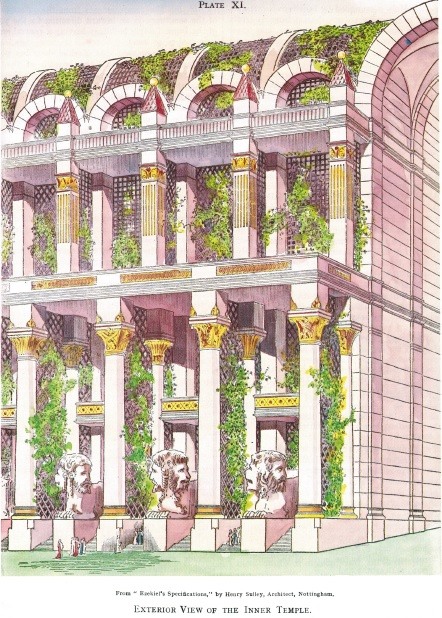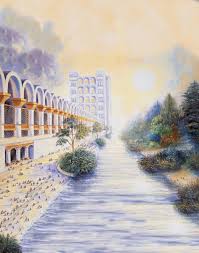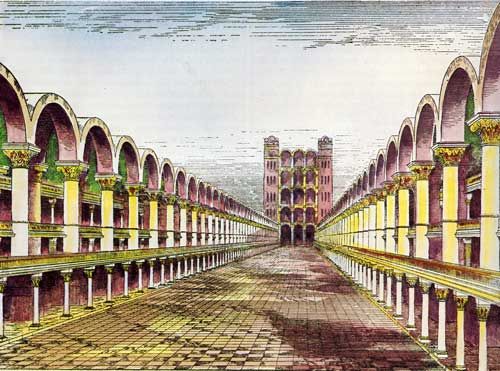EZEKIEL 40
Jerusalem the centre of Jewish authority.
The vision comes when Jerusalem is desolate
By the comparison of chapters i. 2; xxxiii. 21; and 2nd Kings xxiv. and xxv., we find that the captivity of " Jehoiakim, his officers and mighty men," &c, is referred to, and that Jerusalem is the city that was smitten...
These events were the consummation of that retribution which God foretold should come upon the children of Israel consequent upon their breaking the solemn covenant made at Sinai and in the land of Moab... at a time when the kingdom of David was overthrown; when desolation reigned over the once glorious land of Israel; and when the city of Jerusalem was in ruins. Occurring at such a time, it occupies a peculiar position in relation to the history of Israel...
It came just as the fruits of disobedience had burst upon them, and appears to divide their
history into two epochs—one ending with their complete desolation, and the other with their complete restoration.
THE TIME OF THE VISION
IN the first verse, Ezekiel informs us that " the hand of the Lord" was upon him in the five and twentieth year of what he styles "our" captivity, and fourteen years after the city was smitten. By the comparison of chapters i. 2; xxxiii. 21; and 2nd Kings xxiv. and xxv., we
find that the captivity of " Jehoiakim, his officers and mighty men," &c, is referred to, and that Jerusalem is the city that was smitten.
These events were the consummation of that retribution which God foretold should come upon the children of Israel consequent upon their breaking the solemn covenant made at Sinai and in the land of Moab, as it is written:
" If ye will not hearken unto Me, and will not do all these commandments ; and if ye despise My statutes; or if your soul abhor My judgment, so that ye will not do all My commandments, but that ye break My covenant: I also will do this unto you; I will make your cities waste, and bring your sanctuaries unto desolation, and I will not smell the savour of your sweet odours. And I will bring the land into desolation, and I will scatter you among the heathen, and will draw out a sword after you, and your land shall be desolate, and your cities waste."—(Lev. xxvi. 14—16, 31—33)
The vision itself contains indisputable evidence of its association with the time of restoration. After Ezekiel was made to "see" the chief constructional features of the building, which is the centre of the vision, he is shewn how " The glory of the Elohim of Israel" enters the house, and hears a voice saying,
" Son of man, the place of my throne, and the place of the soles of my feet, here I will dwell in the midst of the children of Israel for ever" (Chap, xliii. 2—7).
The fulfilment of this prophecy involves the complete restoration spoken of in other parts of the Scriptures, when the glory of the Lord shall rise upon Israel, the redeemer having come to Zion, and Jacob is no longer in transgression. Then the Lord will have made a new covenant with the house of Israel. In those days shall Judah be saved and Jerusalem shall dwell safely.
Bro Sulley.
Therefore, the vision recorded in the fortieth chapter was given in a year which would have been reckoned as a year of Jubilee in the days of Israel's prosperity. Under the circumstances, however, it was to them a year, amongst others, of sorrow, mourning, and woe.
Fourthly—Ezekiel was a man of SIGN to Israel (see chap, iv· 3—6) both as regards their affliction and their prosperity. From these premises it is reasonable to conclude—
a. That inasmuch as a complete vision of the building was given to Ezekiel in a Jubilee year, there is a Jubilee year yet future, when the building seen by him in vision will have real existence; that it will be finished and opened for public worship on that date.
b. That such Jubilee will fall on the feast of the Passover, and that by the tenth day of the first month the sacrifices will be in preparation, and all things in readiness for the " glory of Yahweh" to enter the newly erected house.
c. That the construction of the building will be associated with the national regeneration of Israel, when the Father will " forgive their iniquity, and remember their sins no more," " blotting out as a thick cloud their transgressions" (Jer. xxxi. 34; Is. xliv. 22) ; so that
by the time that the top stone is fixed, and the last pavement laid, their enemies will have been destroyed; and all their bondage, whether literal or spiritual, will end in the great Jubilee then inaugurated.
d Seeing the day of Israel's deliverance from Egypt was signalised as a beginning of months and years unto them (Exod. xii. 2), this greater deliverance, which involves not only regeneration to the house of Israel, but blessing to all the Gentiles, will be the starting point of a new age, in which official records will not date from " the year of our Lord"' or the reign of some Gentile king, or from " Jehoiakin's captivity," but from the day defined in the vision itself, when the offerings of the Israelitish people are once again accepted.
Bro Sulley.



